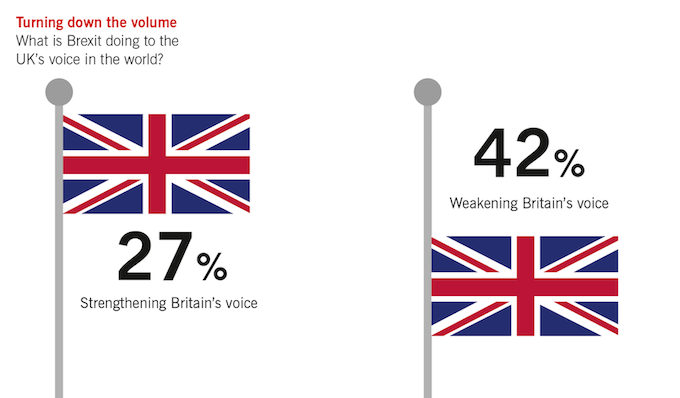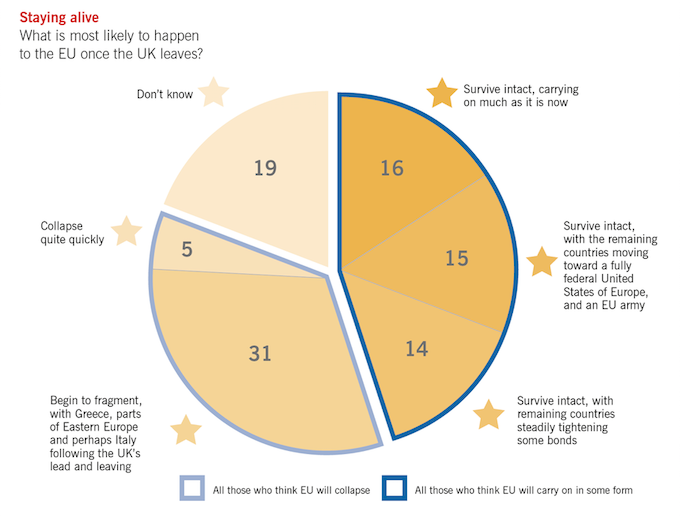
The public is no longer convinced that the Brexit referendum was “fair and legitimate,” according to a new Deltapoll survey, exclusively for Prospect. Days after the controversial bank-roller of the Leave.EU campaign, Arron Banks, was referred to the National Crime Agency, it finds that 42 per cent of voters look back on the referendum as “unfair and illegitimate” against just 38 per cent who think the reverse.
The government, from the prime minister down, has argued since 2016 that whatever side of the referendum people were on they accept the result, and “want us to get on with it.” These numbers call that claim into question. Indeed, Martin Boon of DeltaPoll sees “just how deep is the fault line that Brexit has cut across our politics. The small print of the survey shows that roughly two-thirds of Remainers, in a 64:21 split, look back on the referendum as unfair, but that is almost exactly mirrored by a 63:22 in the other direction among leavers.”
The poll was done for the December issue of Prospect, which examines how Britain could still pull back from the brink, and will appear next week as the Brexit negotiations near their climax, and parliament gears up for the “meaningful vote” which will accept or reject the deal May hopes to strike. As they weigh which way to go, MPs may be alarmed to learn that more Britons (48 per cent) believe from what they have seen or heard of Brexit so far, that it is weakening Britain in the world, against the mere 27 per cent who believe it is making Britain stronger. Again there is evidence of a split along referendum lines—a plurality of Leavers, 48 per cent, still believe Brexit is strengthening Britain, whereas among Remainers an overwhelming 73 per cent think that it is making Britain weaker.
Deltapoll also probed voters on their views of where Brexit and Europe more widely is headed. Despite Britain’s departure, more voters than not—45 per cent—think the European Union will survive intact. Only 36 per cent believe Brexit is just the start, and that Europe will fragment. The Euro-optimists break down pretty evenly among those who expect it to continue much as now (16 per cent); those who expect some more integration (15 per cent); and those who expect it to evolve into a full-on United States of Europe with its own army (14 per cent). The Euro-pessimists, by contrast, are more likely to envisage a few countries—“Greece, parts of Eastern Europe and perhaps eventually Italy”— splintering off, something 31 per cent expect, against a mere 5 per cent who expect Europe as a whole to “begin to collapse quite quickly.”

So more voters than not think the EU is here to stay, which raises the question of whether Britain “might want to consider rejoining.” Again, many more voters, 48 per cent, believe Britain might one day decide to do exactly that, than the 29 per cent who believe Britain will never want to rejoin. Roughly a third—35 per cent—believe London could be knocking on Europe’s door within a decade, and more than a fifth—21 per cent—expect this within a couple of years.
One reassuring finding for Leavers, however, is that only 9 per cent expect consideration of a rejoin to happen “straight away,” which might suggest that the country is very much primed to expect Brexit to go ahead in some form next year.
Boon adds: “with the Brexit talks entering their fraught final phase, and with so many big questions still up in the air, perhaps we should not be surprised to discover doubts about where the process is headed. Even so, there is no disguising that Britain is getting the jitters: more people than not tell us they’ve doubts about the referendum, and many more people than not think the whole process is weakening the country. Many expect Europe to get by OK without us, and many also expect that before too long we could be asking to go back in.”
Amid knife-edge calculations about what May and the Conservative whips can get through the Commons, there is increasing talk about the crucial role that a group of Labour MPs could play in rescuing the Brexit deal. The issue is no longer only the small handful of committed Labour Brexiteers, such as Kate Hoey, but also a wider of group, potentially including the northern MPs Lisa Nandy and Caroline Flint, who feel the heavy Leave votes in their own constituencies keenly, and have stressed the potential need to seriously consider voting for May’s proposal rather than risking no deal.
But the detail of the new poll on what the Labour voting base is thinking may toughen up the party’s resistance to Brexit. A clear majority among them, 56 per cent, now regard the referendum as unfair and illegitimate, twice as many as the 28 per cent who think the reverse. By 65 to 17 per cent, they think Brexit is weakening rather than strengthening Britain. Meanwhile, fewer than a quarter of Labour voters (24 per cent) see Europe as fracturing or collapsing; fewer than a fifth (18 per cent) are convinced Britain will never want to rejoin.
In December’s Prospect: Timothy Garton Ash, Oxford’s leading scholar on Europe, explains how Brexit fits into a wider European crisis in which he spies an opportunity for reform; lawyer David Allen Green argues how Brexit could have been—and still could be—done in a different and better way; former MI6 chief John Sawers warns how exposed British security will be outside the Europe club; plus, your definite guide to the crunch votes in parliament. The magazine is in the shops from Thursday 15th November, and the pieces will be published online before that at prospectmagazine.co.uk
Deltapoll interviewed a representative online sample of 2,033 adults aged 18+ between 2-5th November 2018. Interviews were conducted across Britain and the results have been weighted to the profile of all adults. Deltapoll is a member of the British Polling Council and abides by its rules.
Read Timothy Garton Ash: Brexit—an island on the edge












